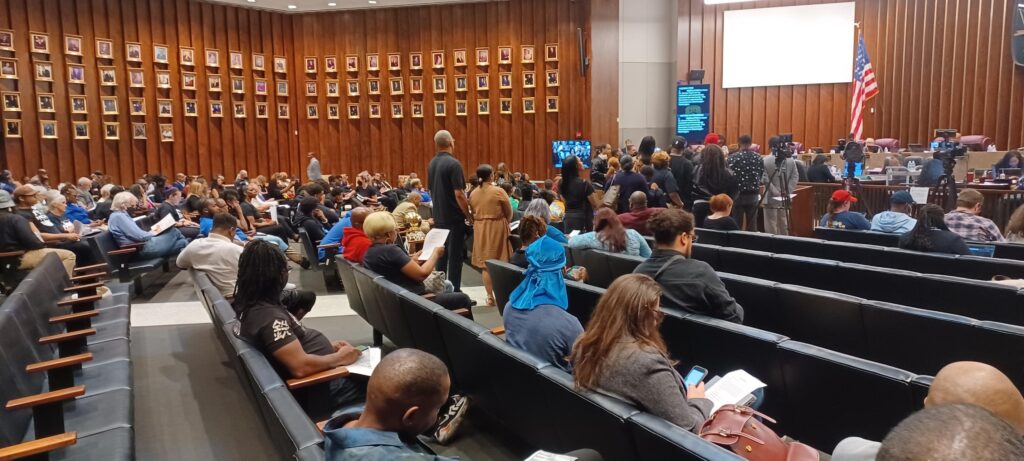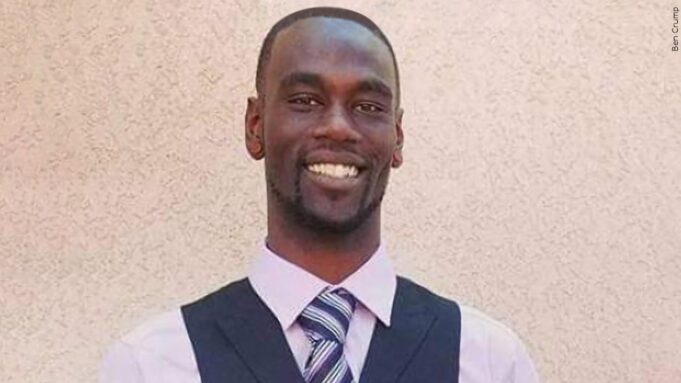by Zakiyyah Muhammad
@zakiyyahmaryam_
MEMPHIS—Local organizers and religious leaders successfully pushed for better police reforms in the city of Memphis. For three months, activists from various organizations worked tirelessly with the Memphis City Council who finally passed ordinances, with hopes that pretextual traffic stops and arrests of Black and Brown motorists for minor infractions can finally be seriously addressed.
On April 11, after several previous delays and revisions, the Memphis City Council passed Ordinance 5849, also known as the “Driving Equality Act in Honor of Tyre Nichols.” Council members passed the ordinance unanimously in an 11-0 vote.
Councilwoman Michalyn Eastern-Thomas shared via Instagram after the council meeting that she was “so thankful” for the support from her colleagues to pass the ordinance. “Since we learned of the death of Mr. Nichols at the hands of MPD [Memphis Police Department] officers, I wanted to ensure I presented meaningful and impactful legislation,” Ms. Eastern-Thomas wrote.
“This is about alleviating any additional weights on the impoverished. This is about diverting MPD resources to protecting our communities and fighting crime in our streets. This is about justice in policing. This is about reform.”
Gilbert Barnes Carter is a community organizer who lived in Memphis for over 20 years. “We are on the cusp of setting a model definitely across the nation in terms of law enforcement reform, but perhaps depending on the country, in areas within certain countries—an international model for law enforcement reform,” Mr. Carter told The Final Call.
According to the ordinance, police would still be able to make traffic stops for primary violations, like aggressive driving and will not make stops for secondary violations like:
Expired registration if the vehicle has been registered with the city within 60 days.
License plates not securely attached to the vehicle, but clearly displayed.
Single brake light, headlight, or running light outages.
Having a loose bumper.
However, police can also stop a driver who has both a primary and secondary violation together.
The “Driving Equality Act in Honor of Tyre Nichols,” takes effect immediately.
The passage of the ordinance came with its challenges and roadblocks. In a previous city council meeting, Councilman Chase Carlisle sponsored an ordinance called the “Tyre Nichols Policing Ordinance,” nicknamed by activists the “Wade Ordinance,” after the city attorney. It would have repealed previous ordinances activists worked very hard to get passed since 2020 and since the death of Tyre Nichols in January 2023. (See The Final Call Vol. 42 No. 18, Vol. 42 No. 19)

Mr. Barnes Carter shed light on the controversy surrounding the crucial vote on that ordinance. He said City Attorney Allan Wade proposed a “preposterous legislation” that would have repealed the last five ordinances. This would have included: Ordinance No. 5850: MPD cannot use unmarked cars during traffic stops except in “exigent circumstances”; Ordinance No. 5848:
MPD is required to do a yearly independent review of the tactics taught at the police training academy; Ordinance No. 5853: MPD is required to routinely collect and regularly publish data related to traffic stops, arrests and use of force complaints; Ordinance No. 5851:
The police department is also required to cooperate with the Civilian Law Enforcement Review Board as it investigates citizens’ complaints of police misconduct and excessive use of force, with the findings and recommendations published regularly in bimonthly reports; and Ordinance No. 5852: After excessive and deadly use of force incidents by MPD, the Memphis City Council may conduct an independent review and publish the findings.
According to MLK 50: Justice Through Journalism, the “Tyre Nichols Policing Ordinance” was backed by Mayor Jim Strickland and authored by City Attorney Wade, who is appointed and is not an elected official. When this ordinance was initially introduced, the family of Tyre Nichols was perplexed.
“(The Nichols’ Policing Ordinance) is not doing enough. It needs to be re-worded. It’s not addressing the issue,” Rodney Wells, stepfather of Tyre Nichols, stated at the time.
“If the five ordinances are not included in why is my son’s name attached to it?,” questioned Rowvaughn Wells, Tyre’s mother.
Mr. Barnes Carter argued that Councilman Chase Carlisle gave a “poor excuse” for the reason the “Wade Ordinance” would need to be passed, citing that legislators in Nashville would eventually repeal it.
“We can’t be concerned about what a White bigot (and) GOP members in Nashville think about our business here. And we certainly should not allow them to have any dealings or influence with the way we wanna see legislation shaped right here in Memphis and Shelby County,” Mr. Barnes Carter explained to The Final Call. Mr. Carter warmly expressed his thanks for the work of grassroots activists, community leaders, the Nation of Islam, and independent news outlets such as The Final Call and MLK50, an independent news outlet in Memphis.
During the Justice or Else! nationwide tour in 2015, the Honorable Minister Louis Farrakhan of the Nation of Islam visited the city of Memphis and shared his words on the issue of police brutality. “The killing of Darrius Stewart (in Memphis, July 2015), and the killing of Black men and women by police (all over America) has to stop.
And, I know that there are police in every city that try to do their jobs, but I also know that there are police in every city that are rogues, who use their badges and their authority as a license to kill. I say this very humbly: This has reached the point of explosion,” the Minister stated.
Prior to the April 11 council meeting, the interfaith organization Memphis Interfaith Coalition in Action and Hope (MICAH) supported the cause by attending a rally led by the Black Lives Matter chapter of Memphis; Food, Not Bombs; and Decarcerate Memphis. MICAH is a coalition founded in 2020 consisting of community leaders, activists, clergy, and concerned residents who “uplift the people’s definition of safety by shifting power and resources from punitive measures to community-led solutions.” MICAH also held its own prayer rally in front of the city hall minutes before the April 11 council meeting ahead of the vote.
“We think it’s important because we are driven by this value that we share for human dignity and worth, that all of us are made, um, in the divine image that we are all honored and that translates to us being heard in these community forums and getting justice for one another, including, the Wells family but not limited to them,” said Ayanna Watkins executive director of MICAH.
Memphis City Council Chairman Martavious Jones allowed local residents and activists to share their comments and concerns to the council after the passing of Ordinance 5849.
“I sat in the public safety committee meeting this morning and I listened as Councilman Chase Carlisle comforted the police department, that if the police officers violated the pretext ordinance that the officers whatever they found in it will still be a legal arrest. And I find that to be the comfort of oppressors.
And I think that to comfort oppressors they build up a system of violence in the city,” said Joshua Adams during his remarks. “That system of violence is actually what conspired to kill Tyre Nichols on January … of this year. And so as a representative of the public, I think it’s atrocious that you lift your voice to comfort an oppressive behavior by the police department.”
Maria Oceja: “I can tell you as somebody who lives in NutBush, that this is something that we see every day. We see police officers targeting Black and Brown working-class community members, pulling them over for pretextual traffic stops that lead to their arrest or even their deaths,” said Maria Oceja.
“I encourage you to pass the ordinance and strengthen it to include driver’s license, registration, and insurance violations in the list of violations that people cannot be pulled over for. These violations (that) make 43 percent of all traffic violations are in no way a threat to other safety. So, in addition to providing opportunities to police, to harass and brutalize individuals, this is criminalizing poverty.”













